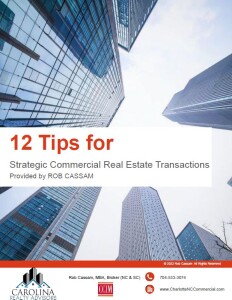This month’s newsletter has just been released! Check out the latest tips for tenants and users of commercial real estate space.
In this issue
- Leased Property—Interesting Investment
- High Leverage – A Benefit With Options
- Overall Plan For Land Acquisition/li>
- The Future Of Investments
- Commercial Real Estate Representation
When we write or talk about real estate “investments” it is usually with the idea of ownership of the property. When you own the investment property, the opportunities for profits and cash flow from it are thought of as rent paid by a tenant to the owner. The owner also has a potential profit that can come from the later gains when the property is sold.
Since the emphasis is on ownership, the average real estate investor might not think about the cash flow and potential profits from a property that is leased rather than owned. However, there are investors who specialize in making profits, sometimes big profits from properties that they do not own.This cash flow from a lease can be extremely interesting. Often the lessee making a huge profit has a relatively small cash investment in the property.If you were the lessee of a building and wanted to make a profit on a possible sublease of some of it, who would your “customer” be?…….(more)
Leverage is the use of borrowed money to control something of value. Real estate investments for many years have afforded the investor some extreme leverage situations. Let’s examine leverage. If double-digit inflation returns, controlling the maximum amount of real estate may be extremely desirable. High leverage is an excellent benefit. Remember though, that with an option there is a problem. Options have an expiration date. If you haven’t gotten the desired increase in value by the time the option expires, you must make the choice – buy the property and wait longer, or let the option expire. An option is simply a contract that gives the purchaser a right to buy a certain property at a certain price for a certain period of time. Sometimes a seller will sell an option to purchase his property because the amount of money paid will solve an immediate problem, and it really does make him feel that the property is sold, or will be sold.
….(more)
The acquisition and improvement of land is a large-scale operation and requires large amounts of capital. This has created methods of land acquisition that gives the developer access to and control over a large enough tract to make development economical without requiring an initial outlay of all of the capital necessary to acquire such a tract. From the point of view of the landowner, the disposal of a large tract at a good price may require a formula that will encourage the developer to commit improvement and development money for part of the tract that will build future value into the entire tract…..(more)
Which way is the right way in real estate investments in 2018? What is the future in these investments? An answer to these questions can be an interview with an interested professional real estate broker who can act as a real estate investment counselor. Each prospective investor can be interviewed in depth to find out specific needs in an income property. At the same time their needs are being evaluated, the broker will also communicate what benefits are available in various properties and how to identify them. Some considerations should be given to the risk of loss for each age bracket of investor. Should an older investor purchase a property with the smallest down payment and highest leverage position? This will limit cash flow and may cause the property to have a “negative” cash flow. Is this what they want-or do they want cash flow from the property?…..(more)
There are a number of ways to buy, sell or exchange investment or commercial real estate. Having the knowledge of what you can do in some tax situations can be the difference between an annual profit or loss in a property that you intend to acquire or one that you already have in inventory. The professional commercial real estate broker is in the position to represent clients in real estate transactions by setting up sales, exchanges, leases, purchase and sales of options, and management of real estate. A professional real estate practitioner must stay aware of current tax laws and court decisions in order to structure transactions, but does not give legal or tax advice (unless he/she is also an attorney or a certified public accountant). In any complex transaction that might result in changes in any owner’s legal or tax situation, the other members of the “consulting team” should be the owner’s attorney and CPA. We always recommend meeting with these other professionals during the planning and closing of major real estate transactions….(more)




